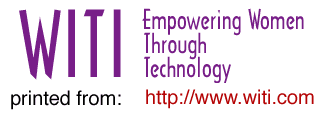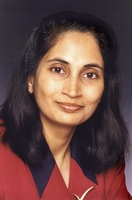
 WITI
Women
WITI
Women
Padmasree Warrior
Vice President
Assisant Director of Digital DNA Laboratories
Motorola
Padmasree Warrior is a vice president at Motorola, a world leader in communications and embedded electronics with annual revenues in excess of $28 billion. Warrior spearheads Process Technology development for Motorola Semiconductor Products Sector (SPS) headquartered in Austin, Texas. Warrior's focus is to drive a leadership technology roadmap that positions Motorola SPS as a premier system-on-a-chip provider. She plays a key role in transforming her company's technology innovations and intellectual property into customer-focused solutions that provide market value. She leads a large organization of technologists and innovators to deliver platforms that catalyze Motorola's SPS portfolio as the "Digital DNAtm, The Heart of Smart" in embedded electronics.
Warrior has extensive experience in all aspects of the semiconductor industry including manufacturing, operations and technology. She has a postgraduate degree in chemical engineering from Cornell University and an undergraduate degree in chemical engineering from the Indian Institute of Technology in New Delhi, India. She is married and has a six-year old son. Her husband is also a senior executive in the high-tech industry and they share the challenge of integrating two dynamic careers with the joy of raising a family.
2. Who has been your
most significant mentor? Why? 3. What has been your
greatest challenge and what strategies did you use to overcome obstacles? 4. Who has been the
most influential person in your life? Why? 5. What lessons have
you learned that would be valuable to women beginning their careers in technology? 6. What strategies
do you use to maintain balance in your life? My family - I make it a point to spend a lot of time with my six year old - we play hard. It's all about dragons, dinosaurs and Pokemon for us these days. Weekends are reserved for my friends to catch-up on music concerts, dance shows and have fun! We almost always take an annual family vacation and get away for a few days whether it is to the next town or some far off place. This is our time together to explore and share.
My community - I contribute time to the Texas State Higher Education
Board and Texas Alliance for Minorities in Engineering. I serve as the
Motorola executive liaison for Cornell University. My contribution to
the community may not be much in time, but it's fulfilling. My self - I
exercise at least four days a week. I enjoy arts and crafts and I meditate
every day, a practice influenced by my Indian heritage. My work draws a lot out of me but then I draw a lot out of my work too. 7. What new technology
do you believe will have the most positive impact on the world in the next 20 years?
The most negative impact? The most negative impact will be from the abuse of
military technology especially biological warfare which debases my
concept of humanism. On the lighter side: 1. If you could have
dinner with any 2 people (living or not), who would they be? The second would be the English author P.G. Wodehouse. I
have read all of his books at least ten times over!! I am a great fan of
his character "Jeeves - the English gentleman's perfect valet". P.G.
Wodehouse is fictituous to me. His intellectual brilliance and audacious
sense of humor fascinate me. I would love to know that he is real. Dinner with P.G.W. sounds simply scrumptious! 2. Define success
in 10 words or less. 3. If you could only
subscribe to 3 magazines, what would they be?
1. What was your first job in technology?
My first job in technology was in water process development at one of
Motorola's semiconductor factories in Arizona. I was hired as a recent
graduate to develop a new reactive ion etch process for dielectrics. At
that time, my project had to be done in a large manufacturing fab due to
short lead times to meet the market window. It was a tremendous
challenge because it was my first exposure to the industry, I was the
new kid on the block (the only female engineer in the entire factory) and
I was under the gun to get the process ramped into manufacturing. I
learned a lot on my first job both technically and socially, having to
overcome gender and culture barriers. I formed many deep friendships
which continue to this day. I would say my first job was the toughest but
also the most rewarding. A year ago when I was appointed as Vice
President I received several congratulatory notes from people that
worked with me on my first job. The fact that they still remembered me
meant a lot.
People have diverse skills. I collect valuable nuggets from almost
everyone I work with, including the people that I lead. So it is hard to
name a single individual as my mentor. Perhaps my most significant and
lasting mentor has been from one of my earlier bosses. I will always
cherish this experience because this individual taught me the
importance of challenging status-quo, being creative and leading with
passion and energy. This particular mentor made me realize that the
possibilities are endless if you have the stamina to pursue the
direction you believe in. To put it in a nutshell, my mentor pointed out
the boundaries to me so I could move beyond them!
My greatest challenge has been one of my career assignments at Motorola.
I was program manager for a technology called RFLDMOS. My job was to get
the technology developed and transferred into manufacturing for revenue.
That sounds easy enough, right? Well, it sounded easy to me until I
started! It was then that I realized that the technology was immature and
the business managers were not very receptive. They were making a lot of
money with the older BiPolar technology, so why change? The
manufacturing and technology organizations distrusted each other! The
assembly operation in Malaysia was kept out of the loop! To top it all,
I had no one reporting to me on this job. I was expected to lead a
"virtual" organization. I had two choices, to quit or take it head on. I
was young and foolish enough to choose the latter. In retrospect, I am
glad I did. Today RFLDMOS is a winning technology for my company where
we face little competition and I can look back and say - I did that! My
strategies were simple - perseverance and influence. I worked hard at
showing others the value of my mission, building strong teams and
celebrating the results with everyone.
I would say that there are three influential people in my life. My
mother, father and husband. Each influenced me in their own special way.
My mom taught me the power of love. I grew up with supreme self
confidence knowing that no matter what I did my mom would be incredibly
proud of me and welcome me home with love and warmth. I learned to focus
on the long term big picture from my father. His sense of humor and
light hearted approach always make me smile. Both my parents have a math
and science background and instilled in me a love for these fields at a
young age. My husband is a pivotal anchor in my life. We met at
Engineering school in India when we were sixteen. Together, we built our
careers and a family. We bounce ideas off one another and constantly
debate issues. His influence encourages me to be independent and take
risks.
Be an expert in your field, know your stuff! Develop a clear, concise
and distinctive communication style. Surround yourself with giants -
don't be intimidated by brilliance from others, leverage it. Lead with
femininity and grace - you don't have to be "one of the boys" to be
recognized as a strong leader. Be professional and always treat people
with respect. Be well organized in how you deliver and be thorough in
what you do. Take charge of your career. Don't wait for the perfect
opportunity to land in your lap--search for it with passion and daring.
A lesson I learned from Bob Galvin is "Leadership is the ability to take
people elsewhere. Lead with humility. Humility does not mean that one
thinks less of oneself, it means that one thinks of oneself less". This
is a nugget I will always carry with me.
I prefer to think of life as an "integration" of different aspects. To
me the word "balance" suggests separate entities. If I think of life as
a balance between work and family, I visualize work and family as
incongruent and in conflict with each other. Therefore, I view life as a
seamless integration of family, community, self and work. It's tough but
I try to maintain this seamless integration.
I think technological breakthroughs in the field of medicine will have
the most positive impact on the world in the next 20 years. I am an
optimist and believe that there will soon be a cure for cancer, AIDS and
other terminal illnesses. It is just a matter of time before there is a
technology-aided medical solution for these illnesses. Medical electronics and
pharmaceuticals are advancing at an incredible pace. This will enhance
the value of life.
The first would have to be Mother Theresa. I'd like to understand how
she sustained commitment to her convictions for an entire life time. She
dedicated her life in a purposeful way to help the poorest of the poor in a
land that was alien to her. In the end, that alien land became her home
and those destitute foreigners her children. I idolize her courage,
determination and risk taking. These are important characteristics in business and technology leadership.
Success is to make a unique, high impact contribution.
That's a tough one. I am an avid book reader but only thumb through
magazines when I am on an airplane. So, I probably would not subscribe
to any magazine! But if I had to pick 3 of my favorite magazines
they would be Fast Company, Silicon India and Smithsonian. The last to
stimulate the non-analytical part of my brain and awaken the latent
artist in me!
For more 'WITI Women' articles, go to: http://www.witi.com/wire/witiwomen/
For all the latest news and information on women in technology, visit http://www.witi.com